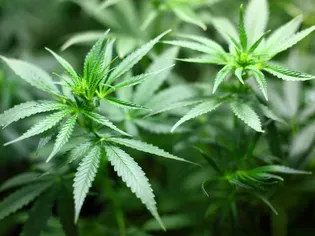Marijuana Toxicity in Cats
Updated on 04/26/24

Marijuana Toxicity in Cats: A Comprehensive Guide to Symptoms, Treatment, and Prevention
As a responsible cat owner, it's crucial to be aware of the potential dangers that can lurk in your home, including marijuana. This leafy substance, often associated with relaxation and euphoria in humans, can have severe consequences for our feline companions. In this comprehensive guide, we will delve into the realm of marijuana toxicity in cats, exploring the symptoms, treatment options, and proactive measures you can take to safeguard your furry friend.
Understanding Marijuana's Impact on Cats
Unlike humans, cats lack the necessary enzymes to metabolize tetrahydrocannabinol (THC), the psychoactive component of marijuana. As a result, even small amounts of marijuana can trigger severe reactions in our feline companions. When ingested, THC binds to receptors in the cat's brain, causing a range of physiological and behavioral changes.
Symptoms of Marijuana Toxicity in Cats
The clinical manifestations of marijuana toxicity in cats can vary depending on the amount ingested, the animal's weight, and individual sensitivity. Common symptoms include:
* Central Nervous System Depression: Lethargy, drowsiness, incoordination, tremors, seizures
* Cardiovascular Effects: Rapid heart rate, low blood pressure, arrhythmias
* Gastrointestinal Disturbances: Vomiting, diarrhea, abdominal pain
* Respiratory Distress: Difficulty breathing, increased respiratory rate
* Behavioral Changes: Aggression, anxiety, hallucinations
Examples of Marijuana Toxicity in Cats
To illustrate the severity of marijuana toxicity in cats, let's consider some real-life examples:
* Case 1: A 6-month-old kitten ingested a small amount of marijuana flower. Within an hour, it began exhibiting lethargy, vomiting, and tremors. Prompt veterinary intervention prevented further complications.
* Case 2: A 5-year-old cat accidentally consumed a marijuana brownie. It developed severe respiratory distress, requiring oxygen therapy and intensive care. Despite aggressive treatment, the cat succumbed to its injuries.
Treatment for Marijuana Toxicity in Cats
Timely and appropriate treatment is crucial for cats suffering from marijuana toxicity. Depending on the severity of the symptoms, treatment may involve:
* Decontamination: Inducing vomiting or administering activated charcoal to remove any remaining marijuana from the stomach
* Supportive Care: Providing fluids, electrolytes, and oxygen as needed to stabilize the cat's condition
* Anticonvulsants: To control seizures if present
* Sedation: To calm agitated or aggressive cats
* Close Monitoring: Regular assessments of the cat's vital signs and neurological status
Preventing Marijuana Toxicity in Cats
The best way to protect your cat from marijuana toxicity is to eliminate access to the substance altogether. Here are some proactive measures you can take:
* Secure Storage: Keep all marijuana products, including flowers, edibles, and oils, out of reach of cats
* Supervise Consumption: Never smoke or consume marijuana in areas where cats are present
* Dispose Properly: Discard used marijuana products securely in sealed containers
* Educate Family and Visitors: Inform household members and visitors about the dangers of marijuana for cats
* Consider Pet-Proof Packaging: Look for marijuana products packaged in child-resistant containers to minimize accidental ingestion
Conclusion
Marijuana toxicity is a serious concern for cat owners. By understanding the symptoms, treatment options, and preventive measures, you can help protect your furry companion from this potentially life-threatening condition. Remember, early intervention is key, so monitor your cat closely and seek veterinary attention immediately if you suspect marijuana ingestion. By working together, we can ensure the well-being of our beloved feline friends.
Explore More Pets

Cat Behavior Problems
How to Stop Aggression in Kittens

Long-Haired Cat Breeds
Siberian Cat: Breed Profile, Characteristics, & Care

Cat Behavior Problems
How to Stop Kittens From Scratching and Biting

Long-Haired Cat Breeds
Turkish Angora: Cat Breed Profile, Characteristics & Care

Basic Training
How to Socialize Your Kitten

Short-Haired Cat Breeds
Cute Pictures & Facts About Calico Cats & Kittens

Litter Box Training
Training Your Kitten to Use the Litter Box

Long-Haired Cat Breeds
10 Fun Facts About White Cats